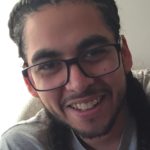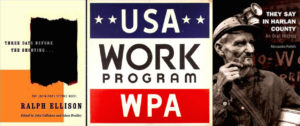“That Something Else”:
Botkin, Portelli and Ellison on Democratic Pluralism and the Dialogical Encounter
Benji de la Piedra, 2014
Featured project in the 2016 Thesis Showcase Series,
“Oral History: From Creation to Interpretation”
My oral history master’s thesis began as an effort to introduce the writings and biography of Ralph Ellison (1914-1994) to the discourse of oral history method and theory. Specifically, my goal was to show that an informed close reading of Book I of Ellison’s novel Three Days Before the Shooting—the fictional life history of a 1950s-era male white liberal American journalist named McIntyre—would greatly benefit oral historians who study and practice in an American context (and by extension, a global one, too). The video and text below get to the heart of this matter.
However, it should be noted that in the last weeks of my thesis writing process, it became apparent to me that in order to show Ellison’s relevance to oral history, I would first have to set up the discourse that he fits into. So I began working towards an intellectual history of our methodology, anchored by the ethical and cultural reflections of literary folklorists B.A. Botkin (1901-1975) and Alessandro Portelli (1942- ).
Below is a selection of my thesis, which articulates Ellison’s understanding of the link between the two concepts referred to in the title of the thesis: democratic pluralism and the dialogical encounter. Building off of Botkin and Portelli’s cosmopolitan understandings of this link, I argue that practitioners of life history methodology ought to heed Ellison’s insistence upon the inexorable tension (and possible incongruences) between individual and cultural identities. One who forgets this tension may unintentionally reify the very stereotypes that oral history is so well positioned to complicate and dismantle.
 Benji de la Piedra grew up in Northern Virginia and Washington, DC. In May 2014, he graduated magna cum laude, Phi Beta Kappa from Columbia University with a B.A. in American Studies. While a student, he spent three years working for Columbia’s Freedom & Citizenship Program, helping coordinate and teach a civic engagement course modeled on the College’s Core Curriculum for first-generation, college-bound high school seniors. Benji wrote his undergraduate thesis on Ralph Ellison’s unfinished second novel, Three Days Before the Shooting, for which he received departmental honors. Ellison’s writings have provided Benji a useful and evocative language for investigating the civic, educational, and artistic implications of American racial identities, which he introduced to the discourse of oral history in his OHMA thesis. In September, Benji and OHMA student Mario Alvarez will begin gathering the life histories of current Columbia graduate students from all backgrounds. With these interviews, they hope to initiate a restorative campus-wide conversation about the ideals and nuanced realities of diversity, belonging, and inclusion at the university. Benji is also at work on the biography of Herbert Denton Jr (1943-1989), a little-known but legendary journalist at The Washington Post whose life provides a unique window onto issues of race, sexuality, and political culture in the second half of twentieth-century history.
Benji de la Piedra grew up in Northern Virginia and Washington, DC. In May 2014, he graduated magna cum laude, Phi Beta Kappa from Columbia University with a B.A. in American Studies. While a student, he spent three years working for Columbia’s Freedom & Citizenship Program, helping coordinate and teach a civic engagement course modeled on the College’s Core Curriculum for first-generation, college-bound high school seniors. Benji wrote his undergraduate thesis on Ralph Ellison’s unfinished second novel, Three Days Before the Shooting, for which he received departmental honors. Ellison’s writings have provided Benji a useful and evocative language for investigating the civic, educational, and artistic implications of American racial identities, which he introduced to the discourse of oral history in his OHMA thesis. In September, Benji and OHMA student Mario Alvarez will begin gathering the life histories of current Columbia graduate students from all backgrounds. With these interviews, they hope to initiate a restorative campus-wide conversation about the ideals and nuanced realities of diversity, belonging, and inclusion at the university. Benji is also at work on the biography of Herbert Denton Jr (1943-1989), a little-known but legendary journalist at The Washington Post whose life provides a unique window onto issues of race, sexuality, and political culture in the second half of twentieth-century history.
